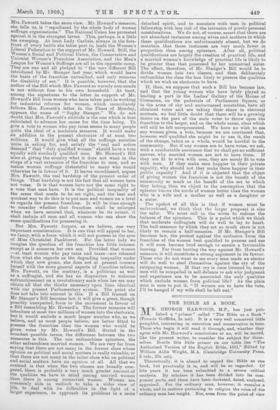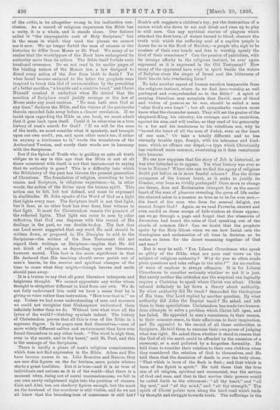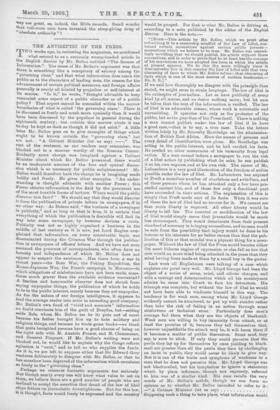THE BIBLE AS A BOOK.
AIR. GEORGE HARWOOD, M.P., has just pub- lished a "primer" called "The Bible as a Book" (Francis Griffiths, is. net). It is a very well conceived little pamphlet, interesting in execution and conservative in tone. Those who begin it will read it through, and, whether they agree with Mr. Harwood's conclusions or no, will be moved, like the present writer, to consider the subject for them- selves. Beside this little primer on our table lies "The Authorised Version of the English Bible, 1611," Edited by William Aldis Wright, M.A. (Cambridge University Press, 5 vols., 20s. net).
Theoretically, it is absurd to regard the Bible as one book, but practically it is, and will be so regarded. Of late years it has been submitted to a severe critical analysis. By scholars it has been divided into its com- ponent parts, and these have been docketed, dated, analysed, appraised. For the ordinary man, however, it remains a whole, and in matters pertaining to religion the voice of the ordinary man has weight. Nor, even from the point of view
of the critic, is he altogether wrong in his instinctive con- clusion. As a record of religious experience the Bible has a unity, it is a whole, and it stands alone. Our fathers called it "the impregnable rook of Holy Scripture," but in the sense in which they used the phrase we cannot use it now. We no longer forbid the man of science or the historian to differ from Moses or St. Paul. We many of us realise that the worshippers of the Book have endangered its authority more than its critics, The Bible itself forbids such irrational reverence. Do we not read in its earlier pages of the binding nathre of the Mosaic law, a law designed to direct every action of the Jew from birth to death ? Yet when Israel became enslaved to the letter the prophets were inspired to break this idol of ceremonialism by the preaching of a better sacrifice, "a humble and a contrite heart," and Christ Himself crushed it underfoot when He denied that the sanction of Scripture could justify revenge or the law of Moses make any meat unclean. "No man bath seen God at any time," declares the Bible, and the visions of the patriarchs therein recorded fade away before a clearer revelation. If we Insist upon regarding the Bible as one book, we must admit that it goes back upon itself. Could it be otherwise in a true history of man's search for God ? "If we will be the sous of the truth, we must consider what it speaketh, and trample upon our own credit, yea, and upon other men's too, if either be anyway a hindrance to it," wrote the translators of the Authorised Version, and surely their words are in harmony with the Scriptures.
But if the Spirit of Truth who is guiding us unto all truth obliges us to say in this age that the Bible is not at all times consistent with itself, is not that tantamount to saying that its authority is gone? This is a difficulty into which the Bibliolatry of the past has thrown the present generation of Christians. The foundation of religion, according to both reason and Scripture, is religious experience,—is, in other words, the action of the divine upon the human spirit. This action can be felt, but not defined, and must be expressed
in similitudes. St. John speaks of the Word of God as a light that lights every man. The Scripture itself is :not that light,
but it does, as no other book has ever done, bear witness to that light. It must for Christendom remain the greatest of the reflected lights. That light can come to men by other reflectors. that God can dispense with this record of His dealings in the past, no one doubts to-day. The fact that our Lord never suggested that any word He said should be written down, or proposed to His Disciples to add to the Scriptures—the writers of the New Testament did not regard their, writings as Scripture—implies that He did not think of religion as depending upon any literature, however sacred. This fact is the more significant in that He declared that His teaching should never perish out of men's hearts, be the smilax and spiritual changes of the time to come what they might,—though heaven and earth should pass away.
It is a truism to hay that all great literature interprets and heightens thought. We cannot appreciate any writer whose
thought is altogether different in kind from our own. We do not fully understand him until we have a sense that he is giving us voice rather than instruction. "How true that is !" we say. Unless we had some understanding of men and manners we could not recognise that Shakespeare understood them infinitely 'better than we do. Without love what were all the lyrics of the world P—tinkling oymbals indeed. The history of Christendom proves that all this is true of the Bible in a supreme degree. In its pages men find theinselves,—men of more widely different calibre and environment than have over found themselves in any other book. "The word is nigh thee, even in thy mouth, and in thy heart," said St. Paul, and this is the message of the Scriptures.
There is hardly a phase of man's religious consciousness which does not find expression in the Bible. Adam and Eve have become names to us. Like Romulus and Remus, they are now diirf figures on the far horizon, mere points whence starts a great tradition. But it is true—and it is as true of individuals and nations as it is of the world—that there is a moment when, rising out of moral unconsciousness, we fall in our own newly enlightened sight into the position of sinners. Cain and Abel, too, are shadowy figures enough, but the mark on the forehead of the murderer is still visible, and do we not all know that the branding-iron of conscience is still hot P Noah's ark suggests a children's toy, yet the destruction of a nation which sits down to eat and drink and rises up to play is still sure. Can any mythical stories of plagues which attacked the first-born, of waters turned to blood, obscure the truth with which the suffering soul of a captive people is drawn for us in the Book of Exodus,—a people who sigh to be masters of their own hands aud free to worship openly the God of their conscience P Can the passion of patriotism, with its strange affinity to the religious instinct, be ever again expressed as it is expressed in the Old Testament How many of the oppressed have wept in spirit beside the waters of Babylon since the singer of Israel cast the bitterness of their hearts into everlasting form ?
To take another aspect of human emotion inseparable from the religious instinct, where do we find hero-worship as well portrayed and comprehended as in the Bible ? A spirit of carping literalism may complain that David, man of blood and victim of passion as he was, should be called a man "alter God's own heart " ; but all. sympathetio readers must know what the chronicler meant. They will set the genius of the shepherd-King, his chivalry, his courage, and his contrition, against his sins, and will realise, as they read of his generosity to a foe and his tenderness to his rebellious son, why he "bowed the heart of all the men of Judah, even as the heart of one man." Or take a totally different and no less eternally lovable type, Joseph, with his tolerance and kind- ness, which no offence can dispel,—a type which Christianity has rendered more common, sweetening as it does resentment into humour.
No one now supposes that the story of Job is historical, or was ever intended so to appear. Yet what history was ever so true to Nature ? Where else can we find the agony of religious doubt put before us in more fearful colours P Has the divine arrogance of the human heart, as it seeks to justify its Creator, ever been so vividly portrayed? Once more to change our theme, does not Ecclesiastes interpret for us the seared heart of the man of pleasure revealing the germ of life under
the charred ashes in a manner so true as to be for ever new,—
the heart of the man who lives for sensual delight, yet cannot forget God ? Again, as we read Proverbs, shrewd and even sordid as these scraps of folk-wisdom at times appear.
can we go through a page and forget that the wiseacres of Jerusalem had heard the voice of God speaking out of the clouds of common life P Can we doubt that the prophets spake by the Holy Ghost when we see how Isaiah sets the theologians and ecclesiastics of all time in derision as he makes us listen for the direct reasoning together of God and man?
But it may be said: "You Liberal Churchmen who speak so glibly of the Bible, what are your real views on the subject of religious authority ? Why do you so often evade plain questions and take refuge in the mist ? " An accusation of want of candour is always offensive. It is for Liberal Churchmen to consider seriously whether or not it is just.
But surely neither the orthodox nor the sceptical can logically require a Christian to speak where Christ was silent. Christ
refused definitely to lay down a theory about ‘authority.
By what authority did He teach ? demanded the theologians of His time: Our Lord replied by another question. By what authority did John the Baptist teach ? He asked, and left them to their speculations. Christendom has made two tremen- dous attempts to solve a problem which Christ left open, and has failed. He appealed to men's conscience, to their reason, to their common-sense, to their affections, to their inspiration, and He appealed to the record of all these authorities in Scripture. He told them to exercise their own power of judging what was right. He asked them whether it stood to reason that the God of all the earth could be offended by the omission of a ceremony, or a soul polluted by a forgotten formality. He told them to consider their relation to their own children when they considered the relation of God to themselves, and He told them that the dominion of death is over the body alone.
"That which is born of the flesh is flesh ; and that which is born of the Spirit is spirit." He told them that the true aim of all religion, spiritual and ceremonial, was the service of God and man, and that in that service their powers would be called forth to the uttermost : "all thy heart," and "all thy soul," and "all thy mind," and "all thy strength." The spirit of Christ points men along the hard road which leads by thought and struggle towards truth. The sufferings in the y are great, as, indeed, the Bible records. Small wonder that toil-worn men have invented the sleep-giving drug of " absolute authority " I












































 Previous page
Previous page